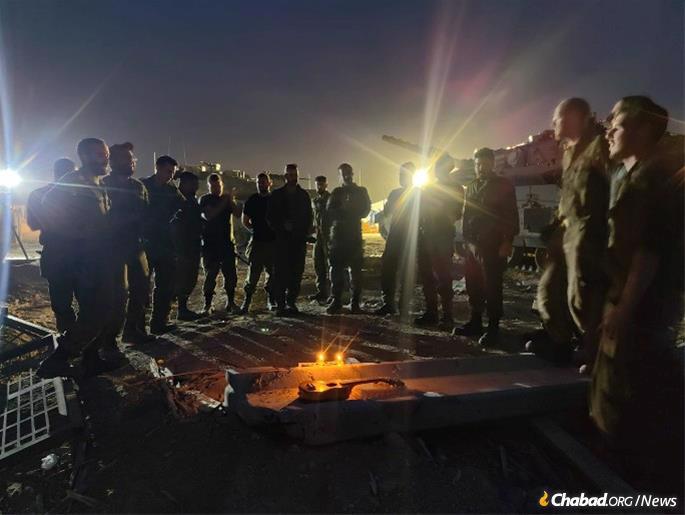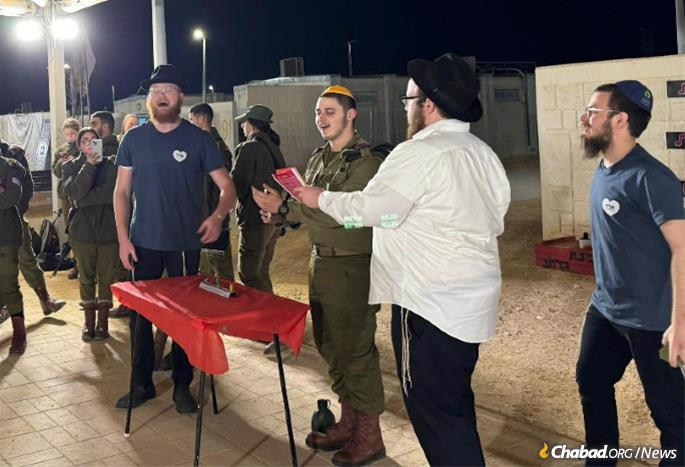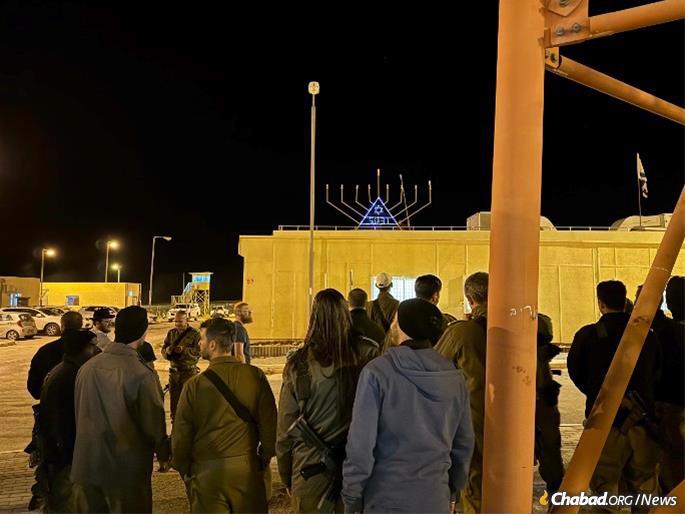BEERSHEVA, Israel —On the first night of Chanukah 5784 (2023), tens of thousands of young Jewish men and women in the Israel Defense Forces gathered to kindle Chanukah menorahs on the frontlines of the war in Gaza—and like 300,000 of their peers at bases and outposts from Metula to Eilat—prayed from the depth of their hearts for the victory of light over darkness, of good over evil, and for the same miraculous providence that G‑d showed their ancestors more than 2,000 years ago.
Then they sang, danced, ate sufganiyot (doughnuts) and got back to business.
“Wherever there are soldiers—at every base and at every outpost—Chabad-Lubavitch emissaries are there with the menorahs, the doughnuts, and especially, with simchah (‘joy’),” said Rabbi Levi Mendelsohn, who coordinates activities for the Chabad Youth Organization of Israel’s United Front, directed by Rabbi Joseph Aharonov. “Our goal is for every soldier to experience the light of Chanukah.”
“Bringing the light and spirit of Chanukah to the frontlines of Gaza is not a simple operation at all,” explained Chabad Youth Organization’s Rabbi Dovid Shatz, who like Mendelsohn is also a reservist in the IDF. “It requires special permits and the strong ties Chabad has had for decades with the army. But they realize that this is the most important for our soldiers right now.”
As it has for the last 50 years, Chabad is ensuring that every base and outpost has at least one giant menorah.
Shatz compares today’s IDF soldiers to the Maccabees of the Chanukah story. “The soldiers fighting in Gaza are literally willing to give up their lives for their fellow Jews, just as it was in the days of the Maccabees, who gave their lives for the people of Israel, and fought so the Torah could be studied and kept, even when it made no logical sense,” he said. “The Chanukah menorahs today inspire our soldiers with that same light and Jewish pride, and will give them the inner strength and faith to win.”
Soldiers will also get their own small tin menorahs with colorful candles for easy lighting.

Making sure that soldiers defending the Jewish people had everything they needed to celebrate the miracle of Chanukah was a central part of the Chanukah awareness campaign launched by the Rebbe—Rabbi Menachem M. Schneerson, of righteous memory—in 1973.
From the start, the Rebbe directed his followers to visit soldiers wherever they were stationed. “They are the representatives of the entire Jewish people, and hold the privilege of shielding the Jewish people with their bodies and souls,” the Rebbe explained on 20 Kislev 5734. It is therefore vital that there be a “Chanukah menorah on every base and outpost, even in a place where there is but one soldier, and certainly where there are many soldiers” and that the menorahs be kindled all eight nights of the holiday, each night by another soldier.
“We even bring the donuts into Gaza!” added Shatz, who mentioned that the Rebbe used to personally help pay the cost of Chanukah doughnuts for IDF soldiers.
Shatz said he is inspired by the Rebbe’s love and care for every soldier. “The Rebbe instructed us many times during wars to go and make the soldiers happy,” he explained. "And of course we are all aware of the ‘tefillin campaign’ that the Rebbe initiated during the Six Day War, when he requested that people go to the IDF soldiers everywhere and help them put on tefillin, because G‑d assures us that it strikes terror into the hearts of our enemies.”
On Duty in Hebron
In the holy city of Hebron, this Chanukah will be very different for Rabbi Danny Cohen, who has been directing Chabad of Hebron for 21 years, serving the soldiers stationed in the volatile city.
“After two decades of celebrating Chanukah with our heroes in green and bringing Chanukah joy to them, for the first time, I’m here on reserve duty with the three other Chabad rabbis, and the younger generation, with my children running the show, are going to be coming to visit us!” he said.
Fifteen yeshiva students are in Hebron to help the Chabad operations and bring Chanukah light to all the soldiers, including Cohen and other Chabad rabbis who are with their units on reserve duty. “For the first time we’re going to be getting a real firsthand experience of what it means to be on the receiving end of visits from representatives of the Rebbe and receive a warm smile for Chanukah!”
While Hebron is usually guarded by young soldiers, ages 18 to 20, it’s now filled with more experienced reservists, many in their 30s and 40s, most with children at home.
“The programs are going to be a bit different from the usual,” said Cohen. Instead of the energetic shows that the younger soldiers enjoy, this time the many planned Chanukah parties will be more focused on study-based content.
“We’re partnering with the Jewish community of Hebron to host a morning saluting to the families of the reserve soldiers,” Cohen said. “We’re inviting their families from all over the country and also planning a party and entertainment for their kids.”
Special Chanukah Events for Female Soldiers
Batsheva Cohen, who co-directs Chabad of Hebron with her husband, is planning three Chanukah parties geared specifically for the female soldiers, who share unique experiences and challenges during wartime.
“The Rebbe encouraged every soldier to purchase a letter in a unity Torah for the Jewish people,” said Batsheva Cohen. “We’ll also focus on signing every soldier up, to provide them extra spiritual protection.”
Of course, as every year, the iconic giant Menorah will also be on display at the Cave of the Patriarchs—a piece of land purchased by our forefather Abraham, the first Jew, more than 4,000 years ago, and the burial place of Judaism’s Patriarchs and Matriarchs—with a lighting ceremony every night of Chanukah.

Jelly Doughnuts for 100,000
On any normal year, Rabbi Mendi Klein of Chabad of Eilat buys 20,000 jelly donuts to deliver to soldiers. This year, the number skyrocketed. At the beginning of the war, the bases across the Negev desert leading up to Eilat had an estimated 100,000 soldiers, including many reservists. Now, many of those soldiers have already gone into Gaza, though they return for training breaks.
“We have many yeshivah students coming,” says Klein. “They’ll be visiting each base, and make a huge and exciting Chanukah party with the soldiers. The commanders look forward to this every year, and we have to keep up this year, even if operations triple in size.”
The Kleins will also be hosting nearly one hundred soldiers in their home for Shabbat dinner this week.
“We grew very close with the soldiers who are stationed with the displaced families,” said Chani Klein. “We work together with them to bring calm and programming to the children, so it’s natural that we have a special Chanukah meal just for them.”








Start a Discussion